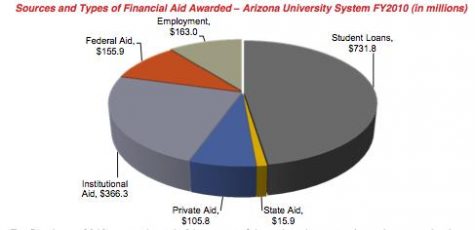Equal Scholarship Opportunities?
May 10, 2016
With graduation quickly approaching, the countdown to college has already begun. Despite where students are being accepted, many of them are seeking financial aid in whatever form it comes. Scholarships and grants are more preferable from taking out loans for obvious reasons, so students explore the options that are currently available to them. Outside of the scholarships offered by the universities they’ve been accepted to, there is also a plethora of organizations and foundations that give generic scholarships to different groups of people. Scholarships can be based on race, location, family income, experience, and various other factors. In the quest to avoid debt, most students find themselves feeling excluded from a multitude of financial opportunities because of the strict boundaries set in place. But do these standards create an equally fair level of opportunity for all students seeking help? The answer is often hard to determine, and even more difficult to justify.
One of the main factors that scholarship organizations use to distribute money is the current financial status the of applicant’s family. In their eyes, if a student’s family has a strong financial foundation then there is less of a need for that student to receive money from a fund. On the other hand, students with a less financially stable background have a larger chance of receiving money. This is the case for most universities who offer generic scholarships to their first year students. It’s not only an incentive for students to choose that school, but also a gauge as to how much that institution values you as a potential future scholar. These types of scholarships are generic and therefore usually don’t come across a great deal of controversy. It’s hard to argue with a system that caters to your own honest assessment of your financial stability.
It’s in the other category where all of the problems arise. Other more specific scholarships are based on merit, location, race, athletic or artistic ability, and an endless list of other factors.
Merit: When organizations judge the academic success of a student, they often fail to comb through the entire transcript and consider the difficulty of classes, as well as countless extra-curricular activities (like sports and work) that often greatly affect the academic ability of a student. This creates a very large blind spot that can only be described as an area of uncertainty in which students feel that their accomplishments are under-represented. In this way, colleges are unfair in the way that they omit certain students from consideration based on a portfolio that doesn’t necessarily consider all angles of student life. Granted, there are other types of scholarships that award students’ dedication in areas outside of academics. However the most money is typically awarded for through merit based scholarships. The largest merit based scholarship (National Merit Scholarship) is known for its fierce competition and exorbitant amounts of money in return. Ninety percent of all recipients of this fund are members of the National Honors Society, so only the most academically committed are eligible.
Location: Colleges often state how much they value diversity in their population. But how are they encouraging out-of-state students to apply when their outside tuition rates are drastically higher than in state? And when they only offer certain scholarships to their in-state students, it sends the wrong message. Location shouldn’t be a deciding factor if colleges truly value student body diversification and aspire to reward hard work despite distance.
Race: Perhaps the most controversial of all parameters for scholarship distribution, race is a prevalent item on the list of considerations. Many organizations offer scholarships to students of specific ethnic backgrounds. Although it’s most often used for statistics purposes, many race-based scholarship funds target students of specific races in an effort to give minority populations a better chance at success. The motives behind such organizations will remain widely controversial for the foreseeable future, but for the most part have been deemed both legally and morally justified. Despite how much similar organizations attempt to cater to all audiences, it seems impossible to please everyone as certain groups will forever feel excluded. For the most part however, race based scholarship funds are helpful for minority students to further pursue their educational goals.
As seen above, the majority of merit based grants available are specifically for white students. Therefore, race-specific scholarships are necessary to even out the remainder of the unrepresented ethnic backgrounds.
Athletic/Artistic: Athletic scholarships are great ways to accommodate students who have devoted extra work ethic towards their extra curricular activities. Whether it’s a high school varsity sport, or any talent that’s not centered around education, colleges recognize and appreciate the student’s commitment to their cause. Sports, arts, or extra curricular scholarships are one of the topics that most people find agreeable when it comes to equality and generic fairness.
There are countless scholarship organizations available to upcoming college students that are almost completely unknown. However, it only takes a minute of researching for graduating seniors to find thousands of opportunities for financial aid. Plenty of them don’t even require essays or large work loads. In fact, most of them only require a completed high school transcript and a copy of ACT scores. The options are very accommodating and most seniors don’t realize how many ways there are to acquire scholarships early on.
Although most scholarships can’t be viewed as “fair” in everyone’s eyes, their diversity and specific targeting make financial aid a bit more reachable for all different types of students. Scholarships are great opportunities for students to lessen the load of tuition regardless of what school they choose to attend. Often students assume that scholarships are primarily designed for students who are in dire need of financial assistance. This is not the case. In fact, winning a scholarship will be beneficial to any student for several years following their receipt of the award. If students are on the fence about committing their time to the process, they’re in danger of missing out on potential life changing rewards. A world of financial aid awaits for graduating seniors, and despite whether or not it provides equivalent opportunities for each and every student, there’s assistance out there for everyone. The decision to pursue those opportunities belongs to the student, but the first step is applying.




